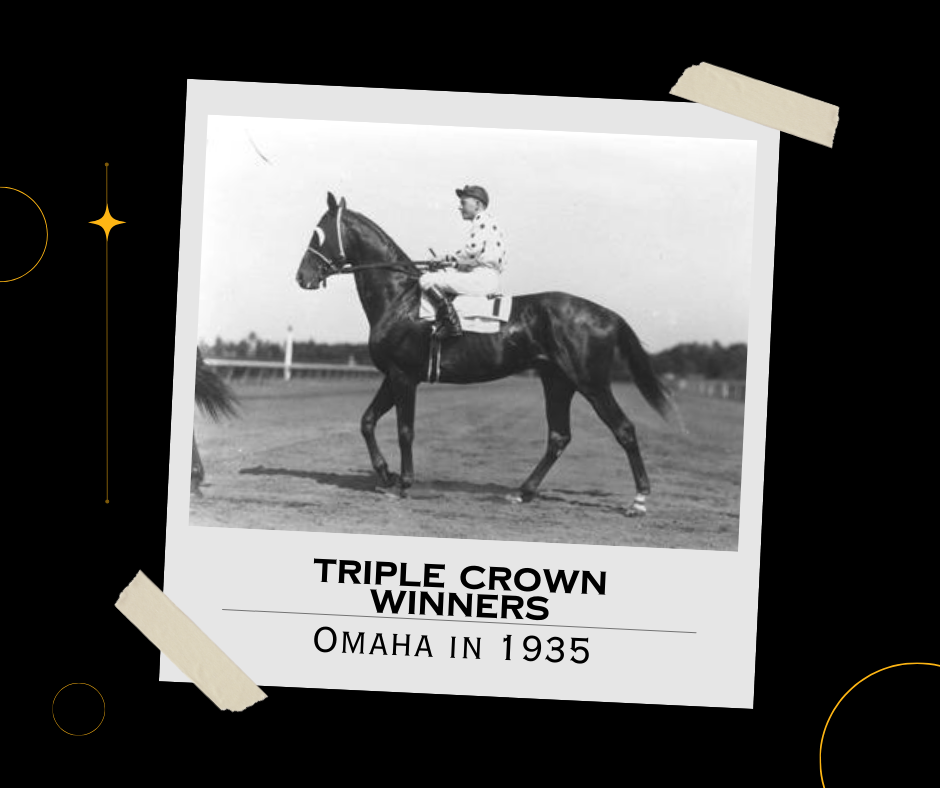Omaha: A Beacon of Hope in the Midst of the Great Depression
In the archives of American horse racing, few names shine as brightly as Omaha, the Triple Crown winner of 1935. His remarkable journey from a promising colt to a racing legend encapsulates the pinnacle of equestrian achievement and a period of significant historical context. We want to showcase Omaha’s life and racing career against the backdrop of the United States economy during the 1930s, exploring the importance of horse racing as a luxury sport during challenging times.
Omaha’s Early Life and Pedigree
Born in 1932, Omaha was the progeny of Gallant Fox, a Triple Crown winner himself, and Flambino. Bred by the renowned Belair Stud in Maryland, his lineage promised greatness. Under the guidance of the legendary trainer, “Sunny Jim” Fitzsimmons, Omaha’s potential gradually unfolded, capturing the imagination of the racing world.
Racing Career Highlights
Omaha’s racing career is a testament to resilience and excellence. He embarked on the challenging path to the Triple Crown as a three-year-old, demonstrating his prowess at each turn. A compelling win at the Preakness Stakes followed his Kentucky Derby victory. However, his Belmont Stakes performance sealed his legacy, overcoming muddy conditions to claim victory and secure the Triple Crown. Omaha’s triumphs extended beyond American soil, with notable performances in England showcasing his versatility and enduring spirit.
The United States Economy in the 1930s
Omaha’s ascension to racing royalty occurred during a period of profound economic turmoil. The United States, gripped by the Great Depression, faced unprecedented challenges. Unemployment soared, banks failed, and despair permeated the national psyche. Amidst this backdrop, horse racing emerged not merely as a sport but as a beacon of hope and distraction from the pervasive hardships.
Horse Racing as a Luxury Sport
In the 1930s, horse racing stood as a testament to resilience, a luxury sport that thrived despite the economic downturn. It provided a semblance of normalcy and escapism for a society yearning for moments of joy and excitement. The sport’s allure was magnified by the stories of horses like Omaha, whose achievements inspired and captivated audiences. Racing also served as a critical economic engine, supporting jobs and fostering community spirit.
Omaha’s Legacy and the Importance of Horse Racing
Omaha’s legacy extends beyond his racing accolades. He symbolized the indomitable spirit of the era, a beacon of hope amidst despair. As exemplified by Omaha’s career, horse racing underscored the importance of perseverance, excellence, and the capacity for sports to uplift and unite.
As we reflect on Omaha’s illustrious career and the context of his times, we are reminded of the enduring significance of horse racing. It is not merely a sport but a cultural touchstone that resonates with themes of resilience, community, and the pursuit of excellence. Omaha’s journey from a promising colt to a Triple Crown champion, set against the backdrop of the Great Depression, encapsulates the transformative power of horse racing. It is a narrative of triumph over adversity, a reminder that even in the most challenging times, stories of hope and glory continue to inspire.
Discover Excellence, Discover GoldMark Farm
Contact us to schedule a visit, discuss equine dry stall and paddock boarding for trainers and owners with 10 or more horses, learn more about our show cattle, or set up a tour of our Triple Crown Museum.
Do you want to stay at GoldMark Farm when you’re in Ocala? Learn more about our luxury apartment here.

0 Comments